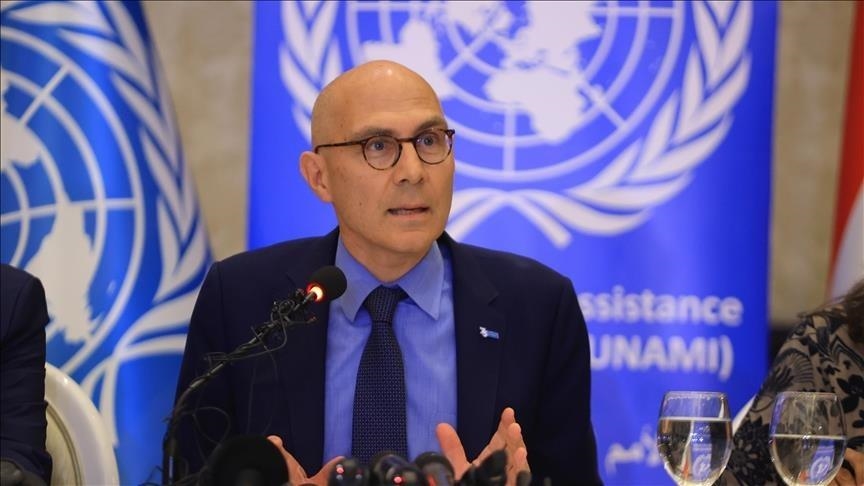GENEVA
The UN human rights chief on Wednesday highlighted the grave human rights violations committed during the past 14 years of conflict in Syria and called for urgent efforts to rebuild the nation and provide justice for victims during his historic visit.
“I came here to offer my reassurances that my office, the Human Rights Office of the United Nations, will continue to support inclusive, nationally owned, and nationally driven processes. there are still very real threats to serious territorial integrity, independence, and sovereignty, which must be fully respected and rigorously upheld,” Volker Turk said at a press briefing in Damascus.
“The ongoing conflicts and hostilities must end,” he told reporters.
Turk said he met with the leader of the caretaker authorities, Ahmed Al-Sharaa, who “acknowledged and assured me of the importance of respecting human rights for all Syrians and all different components of Syrian society, as well as the pursuit of healing, trust building, social cohesion, and institutional reform. We discussed the opportunities and challenges that await this new Syria.
“Human rights must be at the front and center, where everyone can live free and equal in dignity and rights,” he underscored.
“Those responsible for serious human rights violations and crimes must be held accountable,” he said.
Concerns about the most serious war crimes and even crimes against humanity have been documented over the years of conflict, he said, stressing, “Enforced disappearances, torture, the use of chemical weapons, and other atrocities must be thoroughly investigated, and justice must be served fairly and impartially.”
He added that he has been impressed by “the bravery, the fortitude, and the resilience” of the Syrian people he has met, despite the atrocities and trauma they have experienced over the years.
Turk underscored the importance of transitional justice, including the preservation of mass grave sites and documentation of war crimes, as critical components of Syria’s recovery.
He also stressed the need for an inclusive, nationally owned reconciliation process, noting that social cohesion and trust-building must be at the heart of the country’s path forward.
Addressing the dire humanitarian situation, Turk painted a bleak picture, asserting that 90% of Syrians live in poverty, millions remain displaced, and the health and education systems are on the verge of collapse.
He called on the international community to reconsider sectoral sanctions, which he said have exacerbated the suffering of ordinary Syrians.
“I call for an urgent reconsideration of sectoral sanctions with a view to lifting them to move forward. It is critical to address the past wrongs committed by all Syrian actors over the last five decades,” he said.
The human rights chief also emphasized the critical need to address gender disparities, protect displaced people’s housing and property rights, and assist the millions of Syrians who wish to return home voluntarily.
While he expressed cautious optimism about the transitional period, he acknowledged the immense challenges that lie ahead, including criminal justice reform and institutional rebuilding.
He pledged that his office would continue to support Syria’s efforts to align its systems with international human rights standards.
“It is really a seminal moment for Syria after decades of repression,” he said and concluded. “My most fervent hope is for all Syrians to be able to thrive together, regardless of gender, religion, or ethnicity, and to build a common” future.
Turk began his trip to Syria on Tuesday with a visit to Sednaya prison, a symbol of repression by the Bashar al-Assad regime for years, where thousands of detainees are believed to have been executed.
The prison “is littered with memories of extreme cruelty; it is incredible what human beings can do to each other. I can only hope, from the bottom of my heart, that it will serve as a lesson for Syria to recover from its wounds. And for the world, too, so that this cruelty will never happen again,” said Turk.
He described the prison as “a notorious prison complex during the Assad regime” that is haunted by memories of extreme cruelty.
“It’s unbelievable what human beings can do to each other,” he said, adding, “I can only hope from the bottom of my heart that this is a lesson both for the healing of Syria and for Syrians, but also a lesson for the world that we must never allow such cruelties to happen again.”

